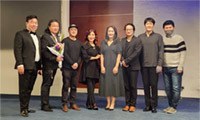Women’s Mariachi Band Crosses Into Male Domain

Reyna de Los Angeles, a mariachi band formed in 1994, is made up of women ranging in age from 16 to 42.
By MIREYA NAVARROLOS ANGELES - In “Companeras, a documentary about the female mariachi band Reyna de Los Angeles, one of the members explains why she is loath to see mariachi music as work.
“Personally, I don’t want to say: ‘Ugh! I have to go play today,’ says Sylvia Hinojosa, a violinist. “I want to say: ‘Yes! I’m playing today! I want to have a break from my school. I am going to have a break from my husband. I’m going to have a break from my house chores. I’m going to get away and be with the girls and play.’ That’s where it is for us.
That so many of Reyna’s members regard the band more as a passionate hobby than a job may help explain why professional female mariachi bands are not as numerous as their male counterparts. But as portrayed on television in “Companeras, marriage, otherhood and meager pay also get in the way.
But the women bring such power and feeling to this 19th-century Mexican tradition that audiences can only assume they know what they’re singing about when they plead for the return of a lover or berate him for his drinking, betrayals and assorted misbehavior.
“I want a man, not a potbellied macho, goes one song in Reyna’s repertory. Mariachi bands have featured women as singers, but all-female ensembles like Reyna, formed in 1994 in Los Angeles and believed to be one of the first such mariachi bands outside Mexico, have been rare.
The film’s producer-directors, Elizabeth Massie and Matthew Buzzell, said that they stumbled across the band in the early 2000s in Los Angeles . The filmmakers then set out to explore the female interpretation of a male-dominated genre.
The creator of Reyna is Jose Hernandez, founder and musical director of the Grammy- nominated all-male ensemble Mariachi Sol de Mexico. Mr. Hernandez assembled the female group after starting mariachi classes for children in Los Angeles public schools in the early 1990s. Half the students who showed up were girls.
The most experienced of the lot was not a Latina: she was Cindy Reifler, a classically trained violinist from Santa Cruz, California, who had played with a male mariachi band and became Reyna’s first leader. Some married, some single, and ranging in age from 16 to 42, Reyna’s members bonded into a tight-knit group. As the documentary’s title suggests, they are companeras.
“When you tell your friend secrets, and she tells you her secrets and her problems, that’s not a friend, that’s a companera, Laura Paloma Cordova, who plays the harp, explains in the film.
The women felt so strongly about protecting that camaraderie that when two candidates auditioned for an open slot, they rejected the obviously better musician in favor of a younger, less experienced one, 19-year-old Angelica Gomez, whose dream of joining a mariachi band is one of the main stories in the film.
Camaraderie can get the female players only so far. While mariachi music generates more than $100 million in record sales each year, according to “Companeras, the genre relies heavily on live performances. Touring, along with nightly gigs at restaurants, are hard to balance with child care needs and work. And the low pay, about $75 a night when the film was made, seems hardly a reason to abandon school, regular jobs or families for the music.
The Reynas may still be regarded more as a novelty than a bona fide group, but Ms. Massie said the companeras have helped smash one stereotype: “They’ve proven that they are as capable of playing the music, she said.
스마터리빙
more [ 건강]
[ 건강]이제 혈관 건강도 챙기자!
[현대해운]우리 눈에 보이지 않기 때문에 혈관 건강을 챙기는 것은 결코 쉽지 않은데요. 여러분은 혈관 건강을 유지하기 위해 어떤 노력을 하시나요?
 [ 건강]
[ 건강]내 몸이 건강해지는 과일궁합
 [ 라이프]
[ 라이프]벌레야 물럿거라! 천연 해충제 만들기
 [ 건강]
[ 건강]혈압 낮추는데 좋은 식품
[현대해운]혈관 건강은 주로 노화가 진행되면서 지켜야 할 문제라고 인식되어 왔습니다. 최근 생활 패턴과 식생활의 변화로 혈관의 노화 진행이 빨라지고
사람·사람들
more
“합창단의 풍성한 하모니”
남가주 한인음악가협회(회장 오성애)가 주최하는 ‘2025 코랄 페스티벌’이 오는 11월2일(일) 오후 6시 어바인의 베델교회(18700 Har…

김주희 제이월드 대표 인재경영대상 특별상
김주희 제이월드그룹 대표가 지난 25일 사단법인 한국인사관리학회가 제정한 글로벌 인재경영대상 특별상을 수상했다. 김 대표는 글로벌 HR과 조직…
건국대 국제재단 창립 기념행사 성황
건국대 국제재단(이사장 이중열) 창립 기념행사가 지난 22일 부에나팍 힐튼 호텔에서 원종필 건국대 총장과 이중열 국제재단 초대이사장, 마크 정…
파사데나장로교회, 오페라와 한국 가곡의 밤
파사데나 장로교회(담임목사 최진영)가 주최한 ‘오페라 아리아와 한국 가곡의 밤’ 음악회가 지난 19일 성황리에 열렸다. ‘이웃을 향한 문화기획…
실비치 레저월드 한인커뮤니티교회 탐방여행
실비치 시니어타운 내 레저월드 한인커뮤니티교회(LWKCC·담임목사 용장영)는 창립 15주년을 맞아 지난 19~25일 제6차 가족여행을 진행했다…
많이 본 기사
- 트럼프 “도요타 100억 달러 미국에 투자…도요타車 사라”
- 美, 태평양서 ‘마약운반’ 의심 선박 4척 공격…14명 사망
- 임시예산안 상원서 또 부결… ‘셧다운’ 한달 넘길 태세
- 아베골프채 선물·노벨상 추천…日, 트럼프 맞춤형 ‘오모테나시’
- 미 기업들 AI 혁신따른 해고 본격화…아마존 1만4천명 감원
- 트럼프, 미중 정상회담 앞 “매우 잘될 것” 기대
- [경주APEC] “한미, AI 수출통제협정 맺기로…우주·양자·6G도 협력강화”
- 트럼프-다카이치, ‘새 미일 황금시대’ 선언…안보·경제 밀착
- “Bilingual, but Burned Out”: Children of Korean Immigrants Turn to Korean Firms Amid U.S. Job Crisis
- California, a ‘Green Vehicle Paradise’... One-Third of New Car Sales
- 제22기 SF 평통회장에 오미자씨 내정
- Exclusive: LA Mayor Bass on Immigration Response, Small Business Olympic Opportunities
- [이런 일도] 무일푼 인생 산 60세… 1
- “No Network, No Job”: Brutal Job Market Awaits New College Grads
- They Graduated, But Couldn’t Celebrate: The Hidden Cost of an American Degree
- “최저임금·오버타임 못받았다” 미주중앙일보, 집단소송 당해
- 8월 주택가격 상승률 둔화세 지속…전년 대비 1.5%↑
- 김민하 “영어 잘하는 이유? 내 나이 기억날 때부터 영어 배워”
- ‘사상 초유 무주자 멀티 고의4구’ 오타니, 2루타-홈런-2루타-홈런 이후 5연속 볼넷→9출루 ‘만화 야구’ 실현
- 하마스, 인질 시신 반환 속였나… “땅에 묻고 다시 파내”
- 히말라야 등반 또 사망 60대 한국인 시신 발견
- 서머타임 해제로 미주노선 출도착 시간 변경
- 트럼프 방일 맞춰 日기업 투자후보 공개…총 4천억 달러 규모
- 하원의장, 트럼프 3선 가능성 일축… “헌법 개정할 방도 없어”
- ‘날강도’로 변한 미국 1
- MS, 장중 시총 4조달러 돌파…애플도 4조달러 공략
- ‘韓 철기둥, 또 빅클럽 간다’ 김민재, 세리에 ‘3대장’이 동시에 러브콜... 유벤투스·AC밀란·인테르까지 “겨울 이적 유력”
- 이민단속 쫓기던 20대 차에 치여 숨져
- 오픈AI ‘공익법인 전환’ 지배구조개편 확정…MS 지분 27%
- 연방농무부, 11월 푸드스탬프 지급중단 발표에 뉴욕주정부 기금, 3000만달러 푼다
- 샌타애나 강풍 영향 주중 90도 폭염 예보
- 오바마케어 보험료 폭탄 현실화되나
- ‘뉴진스 위한 집단’ 팀버니즈 관계자, 알고 보니 미성년자..소년부 송치
- 맘다니, ‘뉴욕은 매물이 아니다’ 퀸… 1
- [경주APEC] 李대통령, 경주로 이동…내일 한미정상회담 촉각
- “셧다운 지속시, 내달 1일 SNAP<푸드 스탬프> 중단”
- DC서 주말 9시간동안 12명 총에 맞아 부상
- 강경화 대사, 재미한인장학기금 장학생 초청 수여식
- [화제의 장수 기업] “양복과 함께 반백년… 세상 하나뿐인 명품 제작 자부심”
- 아마존 역대 최대 감원 본사·사무직 3만명 규모
- ‘전쟁터 방불’ 브라질 대대적 갱단해체 작전… “최소 64명 사망”
- 신임회장 이택래·부회장 장재웅 목사
- 트럼프, 일본인 납북자 가족 면담…김정은과 회담 추진에 영향?
- 韓 검찰, 김범수 ‘SM 시세조종’ 1심 무죄 판결 불복 “일반 투자자 손실”
- 뉴저지서 가장 학비 비싼 ‘스티븐스 공대’ 내년부터 신입생 연소득 7만,5000이하 수업료 면제
- 퀸즈 한인타운 성범죄 ‘사각지대’ 최소 130명
- 트뤼도·페리 공식 연인관계 파리 공연장에서 나란히
- “올해 전 세계에서 가장 강력” 허리케인 상륙에 자메이카 초긴장
- ‘하이브 男돌’ 앤팀 “10월 컴백 대전, 부담 NO..자신과의 경쟁”
- 트럼프 내일 방한하는데…北, 회동 제안에 아직도 무반응
1/5지식톡

-
 테슬라 자동차 시트커버 장착
0
테슬라 자동차 시트커버 장착
0테슬라 시트커버, 사놓고 아직 못 씌우셨죠?장착이 생각보다 쉽지 않습니다.20년 경력 전문가에게 맡기세요 — 깔끔하고 딱 맞게 장착해드립니다!장착비용:앞좌석: $40뒷좌석: $60앞·뒷좌석 …
-
 식당용 부탄가스
0
식당용 부탄가스
0식당용 부탄가스 홀세일 합니다 로스앤젤레스 다운타운 픽업 가능 안녕 하세요?강아지 & 고양이 모든 애완동물 / 반려동물 식품 & 모든 애완동물/반려동물 관련 제품들 전문적으로 홀세일/취급하는 회사 입니다 100% …
-
 ACSL 국제 컴퓨터 과학 대회, …
0
ACSL 국제 컴퓨터 과학 대회, …
0웹사이트 : www.eduspot.co.kr 카카오톡 상담하기 : https://pf.kakao.com/_BEQWxb블로그 : https://blog.naver.com/eduspotmain안녕하세요, 에듀스팟입니다…
-
 바디프렌드 안마의자 창고 리퍼브 세…
0
바디프렌드 안마의자 창고 리퍼브 세…
0거의 새제품급 리퍼브 안마의자 대방출 한다고 합니다!8월 23일(토)…24일(일) 단 이틀!특가 판매가Famille: $500 ~ $1,000Falcon: $1,500 ~ $2,500픽업 & 배송직접 픽업 가능LA…
-
 바디프렌드 안마의자 창고 리퍼브 세…
0
바디프렌드 안마의자 창고 리퍼브 세…
0거의 새제품급 리퍼브 안마의자 대방출 한다고 합니다!8월 23일(토)…24일(일) 단 이틀!특가 판매가Famille: $500 ~ $1,000Falcon: $1,500 ~ $2,500픽업 & 배송직접 픽업 가능LA…
케이타운 1번가
오피니언
 조환동 편집기획국장·경제부장
조환동 편집기획국장·경제부장 ‘날강도’로 변한 미국
 민경훈 논설위원
민경훈 논설위원우로보로스, 상호 출자, 그리고 버블
 이태규 서울경제 워싱턴 특파원
이태규 서울경제 워싱턴 특파원 미·중, 파국은 피했다
 박영실 시인·수필가
박영실 시인·수필가 [화요칼럼] 역사 산책
 이영창 / 한국일보 논설위원
이영창 / 한국일보 논설위원[지평선] 욕망도 ‘내로남불’
 김남극
김남극 ‘순두부’
 옥세철 논설위원
옥세철 논설위원‘물은 지정학적 도구’… 국지적 폭력갈등 빈발

노년의 보약 - 여행
 메건 매카들 워싱턴포스트 칼럼니스트 / CNN ‘GPS’ 호스트
메건 매카들 워싱턴포스트 칼럼니스트 / CNN ‘GPS’ 호스트 [메건 매카들 칼럼] 학계에 일방적으로 유리한 부당거래
1/3지사별 뉴스

맘다니, ‘뉴욕은 매물이 아니다’ 퀸즈서 대규모 선거유세
조란 맘다니(가운데) 뉴욕시장 민주당 후보가 26일 퀸즈 포레스트 힐스 스타디움에서 대규모 선거 유세 ‘뉴욕은 매물이 아니다’(New York…
퀸즈 한인타운 성범죄 ‘사각지대’ 최소 130명

VA 주지사 후보, 한국어 광고
버지니아 주지사 선거가 일주일 앞으로 다가온 가운데 민주당 아비가일 스팬버거(Abigail Spanberger) 후보는 지난주부터 한국어로 광…
“셧다운 지속시, 내달 1일 SNAP<푸드 스탬프> 중단”

제22기 SF 평통회장에 오미자씨 내정
제22기 민주평통 샌프란시스코 협의회장에 오미자(사진)씨가 내정됐다.오미자씨는 28일 본보와의 통화에서 평통 사무처로부터 회장에 임명된다는 사…
트럼프, 29일 경주서, 1박2일 방한 발표

오늘 하루 이 창 열지 않음 닫기 



















































.png)


댓글 안에 당신의 성숙함도 담아 주세요.
'오늘의 한마디'는 기사에 대하여 자신의 생각을 말하고 남의 생각을 들으며 서로 다양한 의견을 나누는 공간입니다. 그러나 간혹 불건전한 내용을 올리시는 분들이 계셔서 건전한 인터넷문화 정착을 위해 아래와 같은 운영원칙을 적용합니다.
자체 모니터링을 통해 아래에 해당하는 내용이 포함된 댓글이 발견되면 예고없이 삭제 조치를 하겠습니다.
불건전한 댓글을 올리거나, 이름에 비속어 및 상대방의 불쾌감을 주는 단어를 사용, 유명인 또는 특정 일반인을 사칭하는 경우 이용에 대한 차단 제재를 받을 수 있습니다. 차단될 경우, 일주일간 댓글을 달수 없게 됩니다.
명예훼손, 개인정보 유출, 욕설 등 법률에 위반되는 댓글은 관계 법령에 의거 민형사상 처벌을 받을 수 있으니 이용에 주의를 부탁드립니다.
Close
x